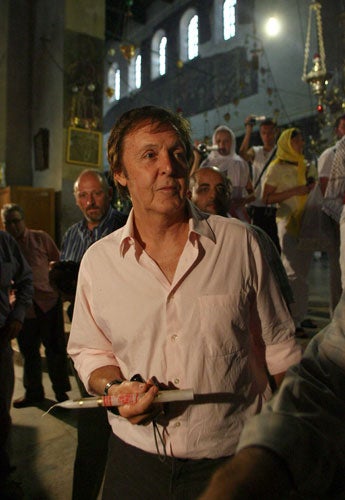Bethlehem all set for McCartney concert

Your support helps us to tell the story
From reproductive rights to climate change to Big Tech, The Independent is on the ground when the story is developing. Whether it's investigating the financials of Elon Musk's pro-Trump PAC or producing our latest documentary, 'The A Word', which shines a light on the American women fighting for reproductive rights, we know how important it is to parse out the facts from the messaging.
At such a critical moment in US history, we need reporters on the ground. Your donation allows us to keep sending journalists to speak to both sides of the story.
The Independent is trusted by Americans across the entire political spectrum. And unlike many other quality news outlets, we choose not to lock Americans out of our reporting and analysis with paywalls. We believe quality journalism should be available to everyone, paid for by those who can afford it.
Your support makes all the difference.The young John Lennon may have once irreverently boasted that the Beatles were more famous than Jesus. But not, it seems, in Jesus's birthplace and among some Palestinians at least.
Before Sir Paul McCartney turned up genuinely unannounced at the Church of the Nativity here yesterday, a bemused policeman, Mohammed Itmazi, 26, confessed that he hadn't heard either of him or of the band that made him world famous. Yes, there had been many famous people coming through, such as Nicolas Sarkozy and, he added, prompted by a companion, Gordon Brown. But Sir Paul, well no, he was not sure who he was.
But the Church of the Nativity is also a place of pilgrims and it was not long before the identity of the new arrival at the holy site, dressed in pink open-necked shirt, grey chinos and grey and white trainers, began to dawn on the relatively modest crowd of early evening visitors. By the time he stepped out of the church and into the bright sunlight in Manger Square, a group of laughing Spanish Catholics were ready to greet him with a chorus of "Yellow Submarine".
Earlier, leaning her head on Sir Paul's shoulder so that she could be photographed by her boyfriend, Irina Kaytkina, 26, from Kiev smiled ecstatically and declared: "This is my dream". As Sir Paul passed on with the grace which characterised the whole of his visit to the West Bank, she said: "I have been listening to The Beatles since I was two or three. My parents love their music and so do I."
In the grotto taken to be the site of the manger where Christ was born, Sir Paul, accompanied by his new girlfriend Nancy Shevell, lit a candle and declared: "The candle is for peace. For all the people around the world. And especially in Israel and Palestine." As he left the grotto – after apologising with unaffected politeness for interrupting worshippers – he bade farewell to one of his hosts, a Greek Orthodox priest, Father Epiphaneus, with the single word: "peace".
Tonight, Sir Paul will play a huge open air concert in Tel Aviv's Hayarkon Park, more than 40 years after the Israeli government banned the Beatles from playing for fear that they would be a "corruptive influence" on the country's young.
But his decision to play in Israel has angered Palestinian groups which favour of a cultural boycott of Israel. It was partly for fear of a demonstration against him that Sir Paul's West Bank trip was switched at the last minute – on British consulate advice – from Ramallah to Bethlehem. He first went to the Edward Said music academy in neighbouring Beir Sahour, where he played the harmonica and piano for the children and gave T-shirts to one and all.
But his decision to go to the West Bank was designed to lend a more balanced image to his trip. Earlier he had been quoted as telling Israel's mass circulation daily Yedhiot Ahronot: "I was approached by different groups and political bodies who asked me not to come here. I refused. I do what I think, and I have many friends who support Israel."
But yesterday he went out of his way here to utter the seasonal greeting for the current Muslim month of fasting, "Ramadan Karim", and said he was bringing "a message of peace". He said he did not agree with those who said that he was furthering the Israeli occupation of Palestinian territory.
Join our commenting forum
Join thought-provoking conversations, follow other Independent readers and see their replies
Comments